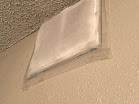Calling pest control is not enough! When there are holes, cracks and crevices, bugs and rodents will find a way in! Whether you have a utility closet with space between the door and wall or a window with a hole in a screen, the key is to not only treat the area, but seal it off.  Check out door draft stoppers or make your own.
Check out door draft stoppers or make your own.

In the photo below, it is clear this is an old doorway wood frame, the resident sealed it with a transparent all purpose caulk (not the white in color). Bugs stopped coming in from the bottom of the wood frame and were also sealed off at the top. If you spray pest control at the bottom of the frame, the bugs will eventually find their way at the top or redirect to other openings. So check every possible area they can run and show up later!
Now in this next photo below, depending on where the water source is located, you will want to consider sealing around the piping with an easy to remove plumber's caulk if permitted. Some concerned residents will use steel wool which also works. Easy to remove caulking is important if piping needs to be repaired.
Bugs and rodents love warm places like underneath the refrigerator. Wouldn't you want to keep these critters at bay? So be sure you don't make it comfortable for them under the refrigerator. Set traps and repellant. You can use essential oils they don't like or bait for them to carry back to a nest.
Pests love under the dishwasher because that is a good water source especially if there are leaks.
Once again make it uncomfortable for them!
Did you open the cabinet over the microwave where the power supply is? What does the space look like up there? If there is a significant opening, seal it off around the power cord.
Behind the stove has much activity because that is a warm place with a ready food source. What does the power supply back there look like? Are there holes? Seal them off!
Didn't think about the space around light switches? Bugs when on the run will not only come out around the outlet but inside it too!
The metal part around the shower comes loose over time and when it does, bugs don't mind visiting while you are in the shower! Yuck!
Around the toilet is a convenient place to run when the light comes on in the bathroom. Be sure there isn't a lot of space for the bigger insects to hide and birth babies!
A baseboard cover is surely not enough particularly if it doesn't meet the floor tightly. So grab that transparent caulk and start squeezing where the flooring has dips just be neat about it.
What do we have here? A closed window, great. However, even if the window is closed,
be sure there are no cracks on the window seal and around it that is a breeding ground for small insects like those pesty gnats!
Now what are you looking at you might ask? Between a wooden door and a door frame along the side rather than the top and bottom. There is a plastic rubber seal that seals along the sides because unfortunately there is a gap from the building shifting over time.
This vent was sealed off with a vent filter on the inside and outside and a homemade trap around it after the ducts had been cleaned out-- a just in case measure--lol. It isn't necessary to go to this extreme unless you have a severe problem.
A bug repellant is in the outlet and the openings are covered to prevent the smaller insects from visiting overnight.
Plenty of insect repellant was sprayed not just in the door tracks but along the sides and on the deck. No problems with insects reported. You have to do this repeatedly over a series of weeks to all entry points before the insects and rodents finally realize, "Oh, I'm not welcome?" Right, so stay away!
The front door has an additional wood frame secured at the bottom, weather stripping on the outside and inside for a tight seal at the bottom. Also a small piece of weather stripping on the inside was placed to cover a small section where there was an opening.
A plastic draft guard that goes up the side of another door frame with a large hidden gap.
Top of the door frame closed off due to a gap at the top of the door where light had once came in which attracted some of the larger bugs.
Other tips to keep bugs away include: use light sources that don't attract bugs, use plug-in repellants, place plants that repel bugs and rodents in and around the home, drop essential oils such as: lavender, peppermint, eucalyptus and tea tree oil that bugs don't like on cotton balls and place around the home, use repellant or kill on contact sprays where problems persist corners, crevices, and entry points. Lastly, run a diffuser with the scents bugs simply don't like during key times when they are known to come out such as 9:30 p.m. to 11:30 p.m.
Consider using fly traps on windows and sticky traps suspended from known problem areas. Rodent traps are helpful to catch the unwelcome visitor, but what good are they if you won't bother to search where the rodent showed up. Fight for your peace of mind and your dwelling--unwelcome guests are strictly prohibited! I hope these tips were helpful!
Nicholl McGuire
Blog Owner
This blog receives profit from marketing the following helpful items that have been rated favorably and used to repel and/or kill bugs, buy yours today!
Simply click the image and order.


































































